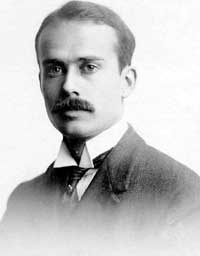Clifford Whittingham Beers facts for kids
Quick facts for kids
Clifford Whittingham Beers
|
|
|---|---|

Beers in 1908, from the frontispiece
of his book |
|
| Born |
Clifford Whittingham Beers
March 30, 1876 New Haven, Connecticut, U.S.
|
| Died | July 9, 1943 (aged 67) Providence, Rhode Island, U.S.
|
| Nationality | American |
| Education | Yale University |
| Occupation | Founder of the "National Committee for Mental Hygiene" (1909) Founder of New Haven's Clifford Beers Clinic (1913), the first outpatient mental health clinic in the United States |
| Known for | Founder of the American Mental Health Movement Author of A Mind That Found Itself (1908) |
| Spouse(s) | Clara (Jepson) Beers |
| Parent(s) | Robert Anthony Beers Ida (Cooke) Beers |
| Honors | Honorary President of the World Federation for Mental Health Chevalier Legion d'Honneur (1933) |
Clifford Whittingham Beers (born March 30, 1876 – died July 9, 1943) was a very important person in American history. He started a movement to help people with mental health challenges. This movement is called the "mental hygiene movement." He worked hard to make sure people who needed mental health care were treated with kindness and respect.
Contents
Clifford Beers' Early Life and Education
Clifford Beers was born in New Haven, Connecticut, on March 30, 1876. His parents were Ida and Robert Beers. He was one of five children in his family.
Clifford went to Yale University and graduated in 1897. He studied at the Sheffield Scientific School. While at Yale, he was involved with The Yale Record and was a member of Berzelius.
Clifford Beers' Personal Journey and Advocacy
In 1900, Clifford Beers faced his own mental health struggles. He was admitted to a private mental institution for depression and paranoia. Later, he spent time in another private hospital and a state institution.
During these times, he saw and experienced harsh treatment from the staff. This experience deeply affected him. It made him want to change how people with mental health conditions were treated.
A Mind That Found Itself: Beers' Book
Clifford Beers wrote a book about his experiences called A Mind That Found Itself. It was published in 1908. The book shared his personal story of being in hospitals and the difficulties he faced.
This book became very popular and was praised by many people. It helped others understand the need for better care for those with mental health issues. The book is still available today.
Founding the Mental Health Movement
Clifford Beers gained support from doctors and other important people. They wanted to help him improve the treatment of people with mental illnesses.
In 1908, Beers started the "Connecticut Society for Mental Hygiene." This group is now known as Mental Health Connecticut.
The next year, in 1909, he founded the "National Committee for Mental Hygiene." This organization is now called "Mental Health America." Both groups were created to continue his work of reforming mental health care.
The Clifford Beers Clinic: A New Kind of Care
In 1913, Clifford Beers opened the Clifford Beers Clinic in New Haven. This was a very important step forward. It was the first outpatient mental health clinic in the United States.
An outpatient clinic means people could get help without having to stay in a hospital. This made mental health care more accessible.
Later Life and Legacy
Clifford Beers became an Honorary President of the World Federation for Mental Health. This shows how much his work was recognized worldwide.
He continued to be a leader in the mental health field until he retired in 1939. Clifford Beers passed away on July 9, 1943, in Providence, Rhode Island.
His efforts made a lasting impact on how mental health is understood and treated.
Honoring Clifford Beers' Contributions
Clifford Beers was honored at The Extra Mile in Washington, D.C.. This place recognizes Americans who have helped others and brought positive social change. Beers was chosen as one of 37 honorees. He is remembered for putting others first to improve society.
See also
 In Spanish: Clifford Whittingham Beers para niños
In Spanish: Clifford Whittingham Beers para niños
 | George Robert Carruthers |
 | Patricia Bath |
 | Jan Ernst Matzeliger |
 | Alexander Miles |

